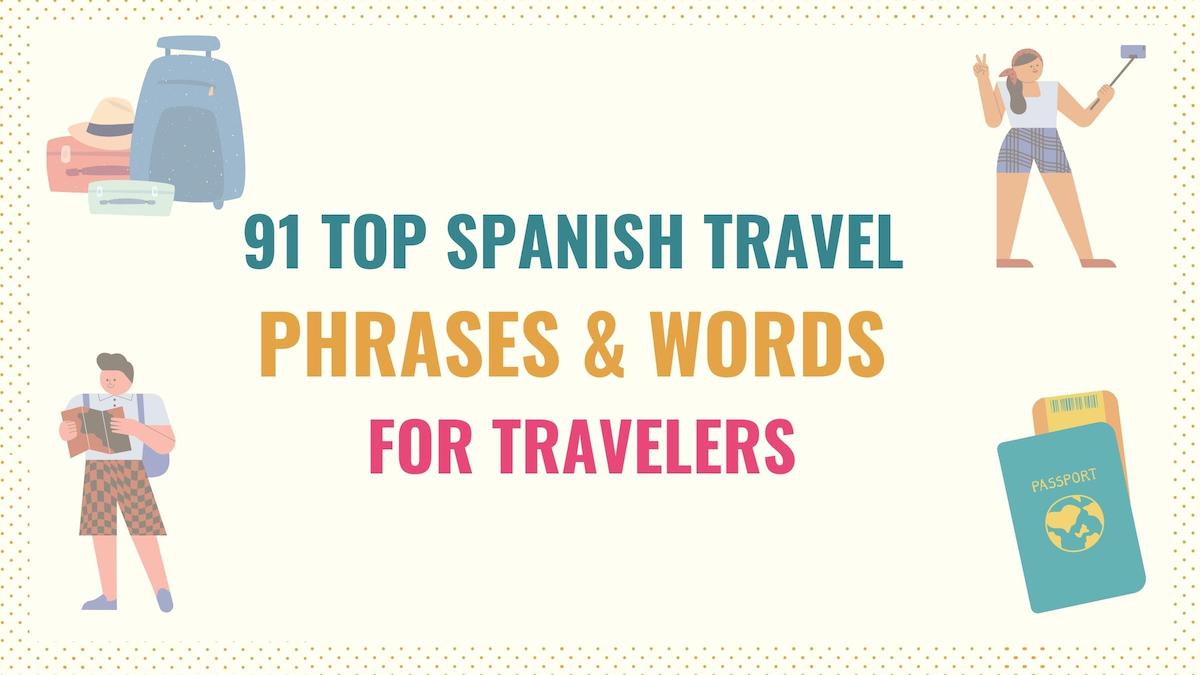Are you planning a well-deserved vacation? Is your destination a Spanish-speaking country? If so, you may want to take the time to learn some essential Spanish travel phrases that can help you communicate.
There’s no doubt that English is a widely spoken language. But if you travel to a Spanish-speaking country, your chances of randomly finding someone who speaks enough English to help you aren’t that high. Trust me, I have seen enough confused tourists to know.
To avoid any communication issues, I’ve built a list of 91 crucial Spanish travel phrases that will help you get by on your vacation. Are you wondering how on earth you are supposed to pronounce them if you don’t speak Spanish? Fear not! I’ve also included the audio recordings to help you overcome this issue.
Here is a quick overview of the situations we’ll cover and the resources you’ll find in this guide:
- Basic Phrases, Questions & Words for Tourists
- Phrases & Vocabulary for the Airport
- Phrases to Use in a Restaurant
- Phrases & Words to Ask for Directions
- Phrases to Use at a Hotel
- Additional Guides & Resources for Travel
Basic Spanish Travel Phrases, Questions & Words
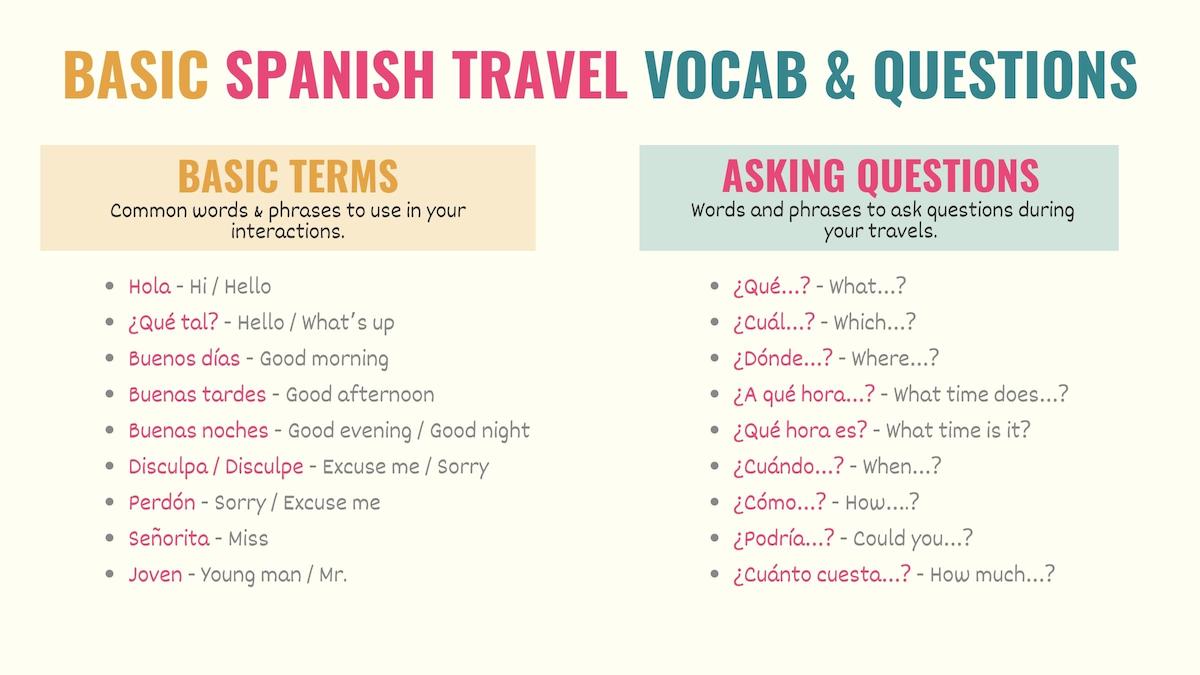
When it comes to Spanish vocabulary for travelers, there are some essential words that you’ll use more frequently or that can help you sound more polite when addressing a native speaker. Let’s start with some greetings and expressions to catch a person’s attention.
As you’ll see in the examples I’ve provided, these words are usually placed at the beginning of the sentence.
- Hola – Hi / Hello
- ¿Qué tal? – Hello / What’s up
- Buenos días – Good morning
- Buenas tardes – Good afternoon
- Buenas noches – Good evening / Good night
- Disculpa / Disculpe – Excuse me / Sorry
- Perdón – Sorry / Excuse me
- Señorita – Miss
- Joven – Young man / Mr.
The following question words and expressions can also be useful when you travel:
- ¿Qué…? – What…?
- ¿Cuál…? – Which…?
- ¿Dónde…? – Where…?
- ¿A qué hora…? – What time does…?
- ¿Qué hora es? – What time is it?
- ¿Cuándo…? – When…?
- ¿Cómo…? – How….?
- ¿Podría…? – Could you…?
- ¿Cuánto cuesta…? – How much…?
Hola, ¿cuánto cuesta el llavero?
Hi, how much is the keychain?
Disculpe, ¿dónde está la catedral?
Excuse me, where is the cathedral?
Señorita, ¿podría darme otro formulario?
Miss, could you give me another form?
Buenos días, ¿a qué hora abre el museo?
Good morning, what time does the museum open?
Basic Spanish verbs for traveling
Many simple Spanish travel phrases are built with the verbs querer, gustar and poder, which we use to make requests. These are the most common forms that you’ll need:
- Quiero… – I want…
- Quisiera… – I would like…
- Me gustaría … I would like…
- ¿Puede…? – Can you…?
- ¿Podría…? – Could you…?
- Tiene / Tengo… – Has / Have
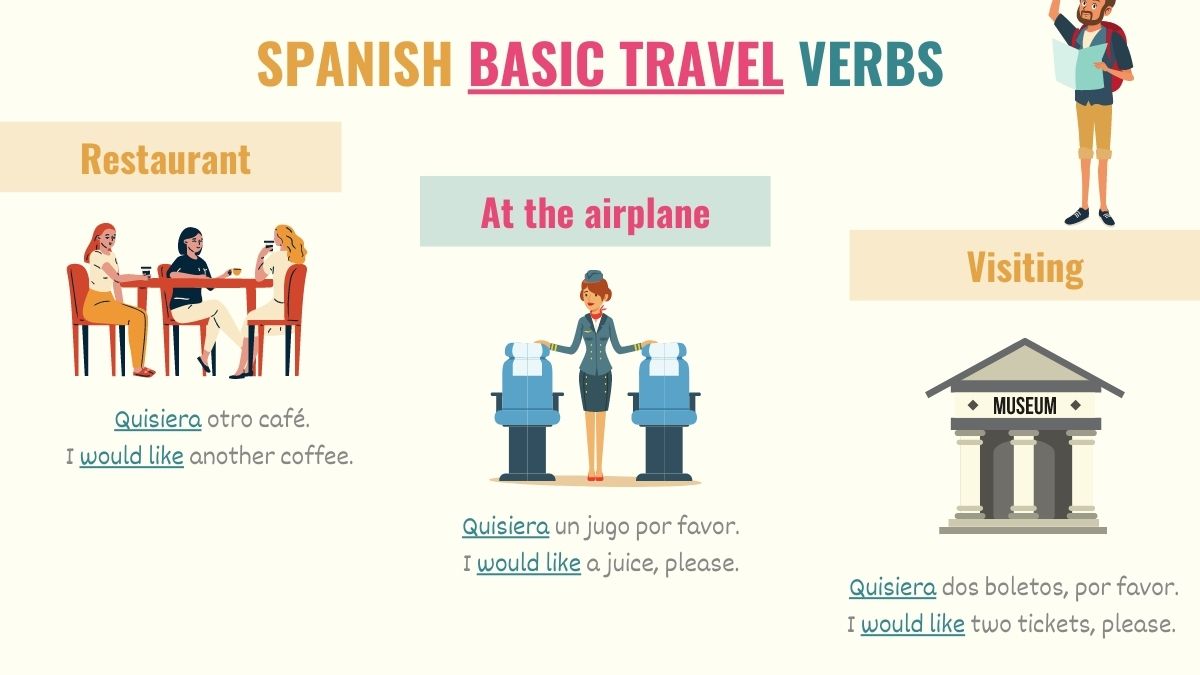
As you can imagine, these expressions are very versatile because they can be combined with different words for tourists:
Quiero dos boletos.
I want two tickets.
No tengo cambio.
I don’t have change.
Me gustaría una habitación con vistas al mar.
I would like a room with an ocean view.
Quisiera visitar el museo de artes.
I would like to visit the art museum.
¿Puede decirme dónde está la parada?
Can you tell me where the bus stop is?
Disculpe, ¿podría ayudarme?
Excuse me, could you help me?
Travel Phrases & Spanish Vocabulary for the Airport
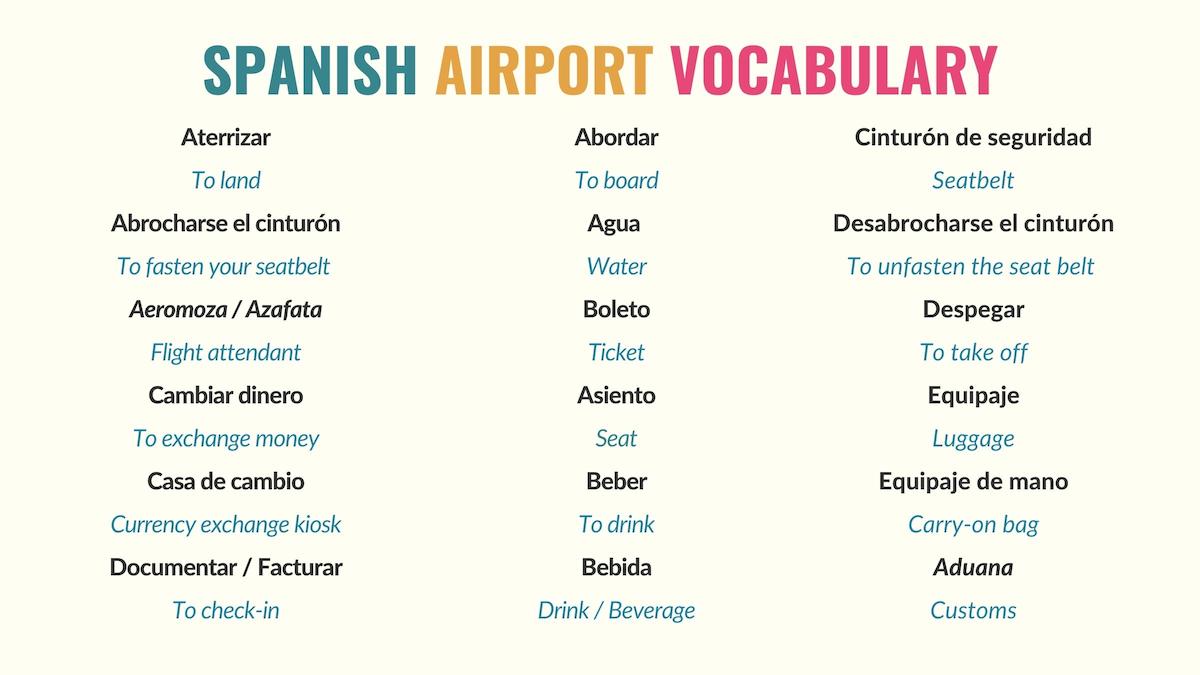
You’re likely to find more than one person who speaks English at the airport. However, this is an excellent opportunity to start practicing your Spanish. Here are some common phrases that you’re probably going to encounter or use while at the airport:
- ¿Va a documentar su maleta? – Are you going to check your bag?
- ¿Me permite su pasaporte? – Can I have your passport?
- Por favor, abroche su cinturón – Please, fasten your seatbelt
- ¿Desea algo de beber? – Would you like something to drink?
- Por favor, regrese a su asiento – Please, go back to your seat
- Llene este formulario, por favor – Please, fill in this form
- ¿Cuál es el motivo de su visita? – What’s the reason for your visit?
- ¿Dónde puedo cambiar dinero? – Where can I exchange money?
- ¿Dónde están los baños? – Where are the restrooms?
In addition to these phrases, here are some words that may be useful in this situation. Remember that you can combine the words below with the expressions and questions you learned in the previous section.
| Spanish | English |
|---|---|
| Abordar | To board |
| Abrocharse el cinturón | To fasten your seatbelt |
| Aduana | Customs |
| Agua | Water |
| Aeromoza / Azafata | Flight attendant |
| Asiento | Seat |
| Aterrizar | To land |
| Beber | To drink |
| Bebida | Drink / Beverage |
| Boleto | Ticket |
| Cambiar dinero | To exchange money |
| Casa de cambio | Currency exchange kiosk |
| Cinturón de seguridad | Seatbelt |
| Desabrocharse el cinturón | To unfasten the seat belt |
| Despegar | To take off |
| Documentar / Facturar | To check-in |
| Equipaje | Luggage |
| Equipaje de mano | Carry-on bag |
| Escala | Layover |
| Exceso de equipaje | Excess baggage |
| Hora de salida | Time of departure |
| Jugo | Juice |
| Maleta | Suitcase |
| Moneda | Currency |
| Oficial de aduanas | Customs officer |
| Pasillo | Aisle |
| Puerta de embarque | Boarding gate |
| Restraso | Delay |
| Tarifa | Rate / Fee |
| Tripulación | Crew |
| Tomar | To drink / To take |
| Ventanilla | Window |
| Vuelo | Flight |
| Vuelo de ida y vuelta | Round-trip flight |
[Basic Spanish expression] + [airport vocabulary]
Quisiera un asiento en el pasillo.
I would like an aisle seat.
Disculpe, ¿a qué hora aterrizamos?
Excuse me, what time do we land?
¿Podría ayudarme? Mi equipaje está perdido.
Could you help me? My luggage is missing.
¿Cuántas maletas va a documentar?
How many bags are you going to check?
Buenos días, ¿tiene café?
Good morning, do you have coffee?
Spanish Phrases for Tourists in a Restaurant
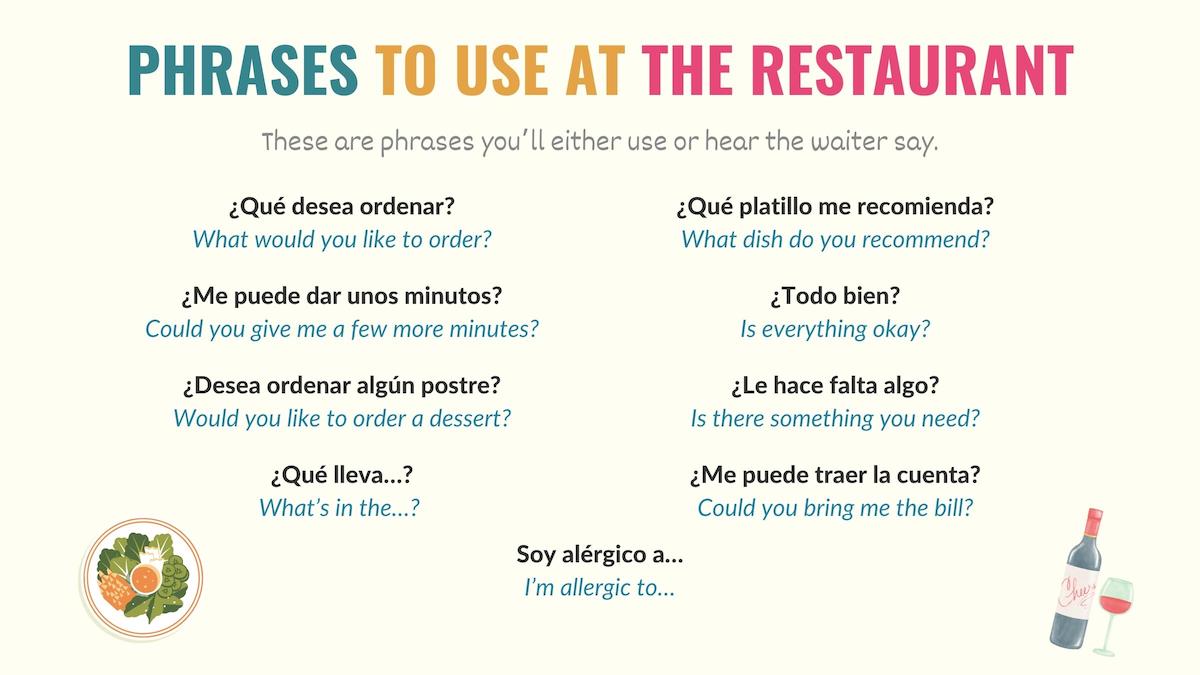
As a tourist, you’re probably going to spend some time trying different foods at restaurants. Here are some common phrases you can use and are likely to hear at a restaurant.
- ¿Qué desea ordenar? – What would you like to order?
- ¿Me puede dar unos minutos? – Could you give me a few more minutes?
- ¿Desea ordenar algún postre? – Would you like to order a dessert?
- ¿Qué lleva…? – What’s in the…?
- ¿Qué platillo me recomienda? – What dish do you recommend?
- ¿Todo bien? – Is everything okay?
- ¿Le hace falta algo? – Is there something you need?
- ¿Me puede traer la cuenta? – Could you bring me the bill?
- Soy alérgico a… – I’m allergic to…
Here are other terms that can be useful in this type of situations:
| Spanish | English |
|---|---|
| Cerveza | Beer |
| Copa de vino | Glass of wine |
| Cuchara | Spoon |
| Cuchillo | Knife |
| Cuenta | Check / Bill |
| De tomar | To drink |
| Especialidad de la casa | Specialty of the house |
| Menú | Menu |
| Mesero / Mesera | Waiter / Waitress |
| Mesa | Table |
| Ordenar | To order |
| Platillo | Dish |
| Plato | Plate |
| Postre | Dessert |
| Taza | Cup |
| Tenedor | Fork |
| Vaso | Glass |
Joven, ¿cuál es la especialidad de la casa?
Young man, what’s the specialty of the house?
Quisiera ordenar dos postres, por favor.
I would like to order two desserts, please.
Disculpe, ¿qué platillo me recomienda?
Excuse me, what dish would you recommend to me?
¿Me podría traer un cuchillo y un vaso de agua?
Could you bring me a knife and a glass of water?
Take Note: If you want to learn more about this topic, I recommend you check this guide on ordering food in Spanish.
Spanish for Visiting the City & Asking for Directions
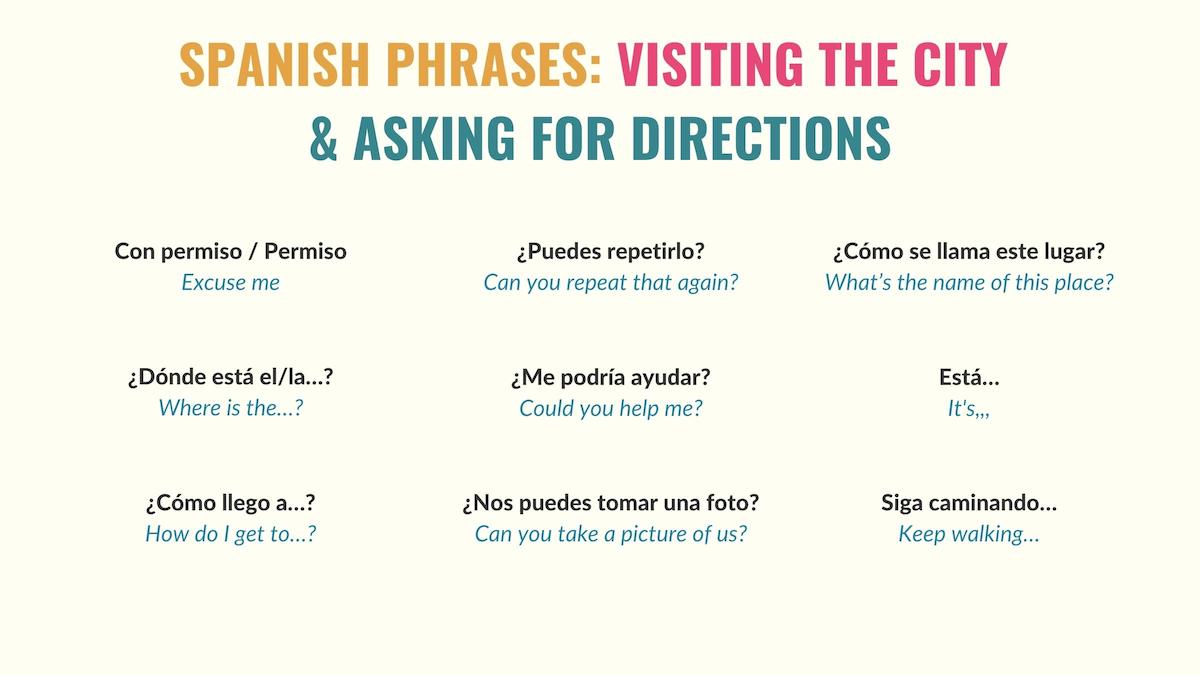
One of the biggest challenges you may face is communicating with native speakers when visiting the city or a tourist attraction. Here are some of the most common Spanish phrases for travel that you may need in this situation:
- Con permiso / Permiso – Excuse me
- ¿Dónde está el/la…? – Where is the…?
- ¿Cómo llego a…? – How do I get to…?
- Estoy buscando… – I’m looking for
- No hablo mucho español – I don’t speak Spanish very well
- ¿Hay algún/alguna… por aquí? – Is there…around here?
- ¿Hablas inglés? – Do you speak English?
- ¿Puedes repetirlo? – Can you repeat that again?
- ¿Me podría ayudar? – Could you help me?
- ¿Nos puedes tomar una foto? – Can you take a picture of us?
- ¿Nos puedes tomar otra? – Can you take another one of us?
- ¿Dónde puedo tomar…? – Where can I take…?
- ¿Por aquí pasa el camión…? – Is this place on the bus route? / Does the bus come by here?
- ¿Cómo se llama este lugar? – What’s the name of this place?
Take Note: Con permiso is a polite way to ask people to let you through. So, we use this phrase in crowded places or when walking on the street.
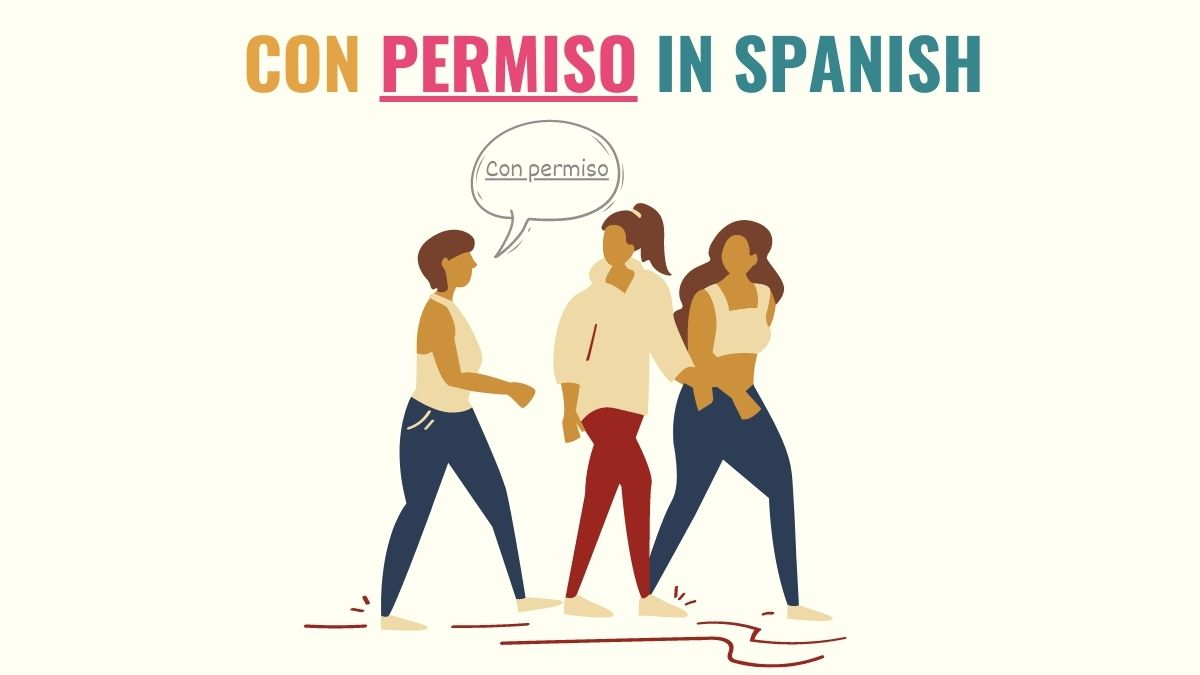
On the other hand, people are likely to give you the following answers:
- Está… – It’s…
- Siga caminando…- Keep walking…
- De vuelta a/en – Turn…
- Siga derecho – Go straight…
- Camine – Walk…
Additionally, here are some basic words that you can use or might hear when visiting the city:
| Spanish | English |
|---|---|
| Al lado | Next to |
| Abrir | To open |
| Boleto | Ticket |
| Calle | Street |
| Camión | Bus |
| Catedral | Cathedral |
| Cerrar | To close |
| Cuadra | Block |
| De distancia | Away |
| Derecho | Straight |
| Derecha | Right |
| Enfrente | Across / In front of |
| Estar | To be |
| Estación de tren | Train station |
| Ir | To go |
| Izquierda | Left |
| La siguiente | Next |
| Museo | Museum |
| Parada | Bus stop |
| Restaurante | Restaurant |
Here are some examples of how to use these Spanish words and expressions:
Disculpe, ¿dónde está la estación de tren?
Excuse me, where is the train station?
Buenas tardes, estoy buscando el museo.
Good afternoon, I’m looking for the museum.
Camine dos cuadras y dé vuelta a la izquierda.
Walk two blocks and turn left.
Perdón, ¿hay algún restaurante por aquí?
Excuse me, is there a restaurant around here?
Hola, ¿me podría ayudar? Quiero ir al museo.
Hi, could you help me? I want to go to the museum.
Spanish Phrases for Hotels & Accommodations
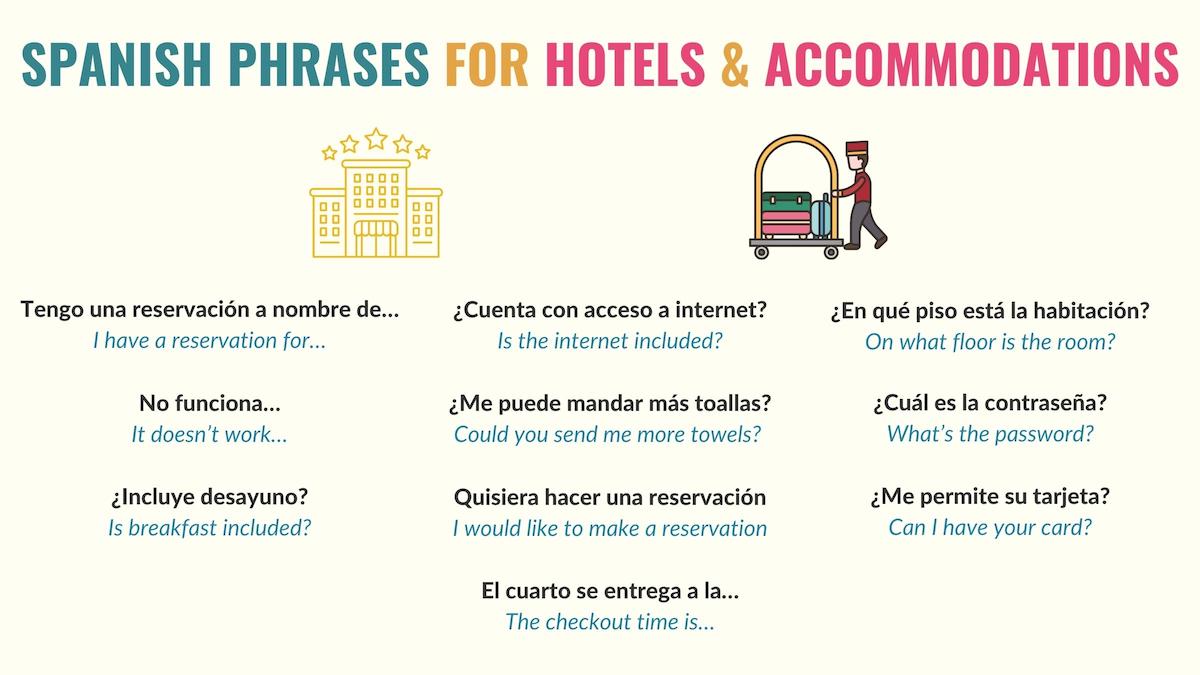
Although nowadays it’s easier to make reservations before your trip, there may be some situations where you need to speak Spanish to communicate with staff and others in your hotel. Here are some essential phrases applicable to this context:
- Tengo una reservación a nombre de… – I have a reservation for…
- Quisiera hacer una reservación – I would like to make a reservation.
- No funciona… – It doesn’t work…
- ¿Me puede mandar más toallas? – Could you send me more towels?
- ¿Incluye desayuno? – Is breakfast included?
- ¿Cuenta con acceso a internet? – Is the internet included?
- ¿Cuál es la contraseña? – What’s the password?
- ¿En qué piso está la habitación? – On what floor is the room?
- ¿Me permite su tarjeta? – Can I have your card?
- El cuarto se entrega a la… – The checkout time is…
As for vocabulary, these are some of the words that you may want to keep in mind:
| Spanish | English |
|---|---|
| Alberca / Piscina | Pool |
| Cobro | Charge |
| Cobrar | To charge |
| Desayuno | Breakfast |
| Desocupar el cuarto | To check-out |
| Elevador | Elevator |
| Habitación / Cuarto | Room |
| Hacer una reservación | To make a reservation |
| Incluir | To include |
| Mucama | Maid |
| Limpiar | To clean |
| Limpieza | Cleaning |
| Llave | Key |
| Piso / Planta | Floor |
| Regadera | Shower |
| Reservar | To book |
| Reservación | Reservation |
| Sábanas | Sheet |
| Salida | Check-out |
| Servicio a la habitación | Room service |
| Toalla | Towel |
Señorita, ¿dónde está el elevador?
Miss, where is the elevator?
Buenos días, la regadera no funciona.
Good morning, the shower doesn’t work.
¿A qué hora termina el servicio a la habitación?
What time does room service end?
Spanish Expressions for Souvenir Shopping
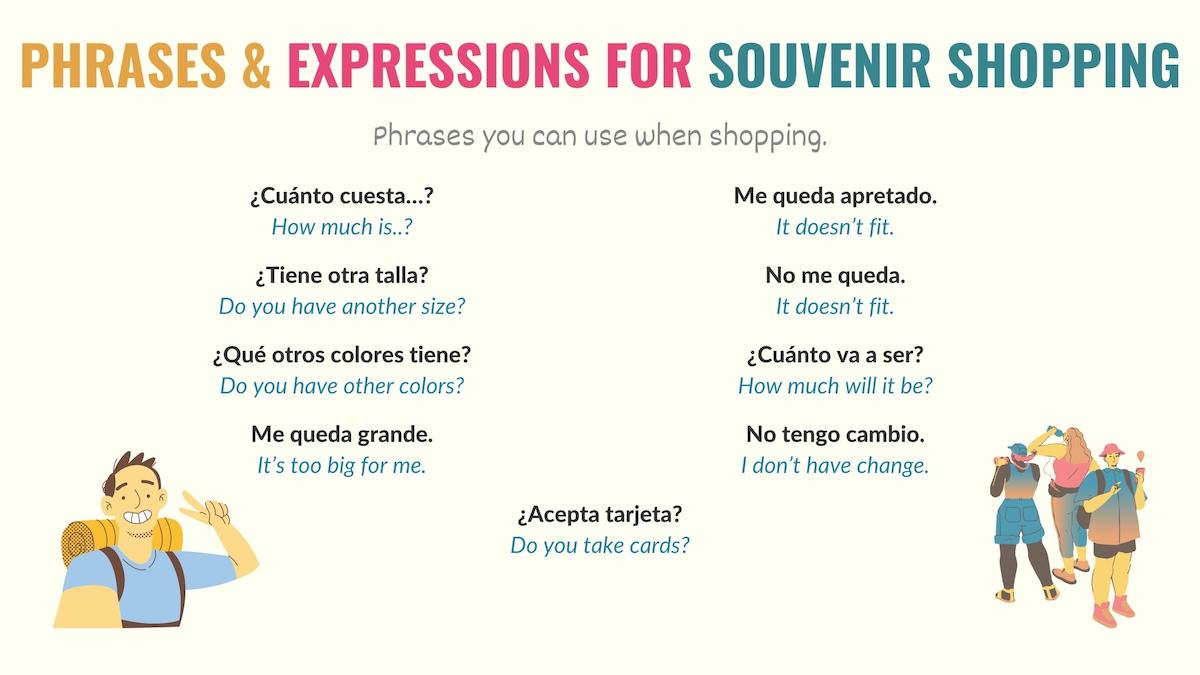
Even if you’re not a big spender, it’s likely that at some point you may want to do some shopping. These are the key expressions that you need in this situation:
- ¿Cuánto cuesta…? – How much is..?
- ¿Tiene otra talla? – Do you have another size?
- ¿Qué otros colores tiene? – Do you have other colors?
- Me queda grande – It’s too big for me.
- Me queda apretado – It doesn’t fit.
- No me queda – It doesn’t fit.
- ¿Cuánto va a ser? – How much will it be?
- No tengo cambio – I don’t have change.
- ¿Acepta tarjeta? – Do you take cards?
On the other hand, these are some of the expressions that the clerk may use with you:
- ¿En qué le puedo ayudar? – How can I help you?
- Pregunte/Vea sin compromiso – You can ask/see, without any obligation.
- ¿Buscaba algo en especial? – Are you looking for anything in particular?
- ¿En qué talla? – What size?
- ¿Cómo le quedó? – How does it fit?
- ¿Buscaba algún color en especial? – Were you looking for a particular color?
- ¿Quiere que le muestre algo? – Would you like me to show you something?
- Es el último que me queda – It’s the last one.
- ¿Tiene un billete más pequeño? – Do you have a smaller bill?
- ¿Qué tamaño buscaba? – What size were you looking for?
- Aquí tiene – Here you go.
As for vocabulary, here are some common objects that you may find during your trip:
| Spanish | English |
|---|---|
| Artesanía | Craftwork |
| Camiseta / Playera | T-shirt |
| Cuadro | Painting |
| Dar | To give |
| Dulces típicos | Traditional candies |
| Grabado | Engraved |
| Llavero | Keychain |
| Número | Shoe size |
| Precio | Price |
| Probador | Dressing room |
| Pulsera | Bracelet |
| Recuerdos | Souvenirs |
| Talla | Size |
| Tamaño | Size |
| Taza | Cup / Mug |
| Típico | Traditional / Typical |

Check the examples below. Notice that you can combine this specific vocabulary with the basic words and questions you learned at the beginning of this article.
¿Tiene dulces típicos?
Do you have traditional candies?
¿Podría darme tres llaveros?
Can you give me three keychains?
Final Points: Spanish for Travelers
Many tourists visiting Spanish-speaking countries face communication difficulties. Let’s face it, there might be some people that speak English and will be able to help you. But chances are that, at some point, you’ll need to use some Spanish. When in Rome, do as the Romans do, right?
To help you with this, I’ve prepared this guide for tourists with basic expressions, questions and words that you’ll use in most traveling situations. Just remember that:
- Many of these travel phrases are built with ‘querer’, ‘gustar’, ‘poder’ and ‘tener’.
- Questioning words can take you pretty far if you combine them with the appropriate vocabulary.
- You use greetings and words to address people to sound more polite.
Hopefully, this guide will help you keep basic conversations. ¡Buena suerte and (disfruta) enjoy your vacation!
Spanish Resources for Tourists & Travelers
To make your trip as enjoyable as possible and get the most out of speaking Spanish, I recommend checking out the free resources below. Here’s my pro tip: Quickly read them and write down a “script” of the most common Spanish phrases, words and expression you’ll need to use while you travel.
Download the PDF with Spanish Phrases & Vocabulary for Traveling
Learning Spanish can be an incredible experience. But it can also be challenging at times, especially when you’re visiting a new place. I’ve created a free PDF for this guide which you can download with the key Spanish phrases, expressions and words you need to start speaking the language while still enjoying your vacation.
Related Guides & Spanish Vocabulary
If you’re traveling to Mexico or another Latin American, Spanish-speaking country then this guide will show you all the vocabulary and phrases you need to interact and order your food at a restaurant.
One of the best ways to get ready for a day of speaking a foreign language is by achieving an easy win as soon as possible at the start of the day. Here are different expressions that native speakers use to say ‘good morning’ in Spanish, which is easy to incorporate into your conversations as well as common Spanish greetings and farewells.
How to Ask for & Reserve a Hotel Room in Spanish: In this article you’ll find different questions and phrases that you and the hotel staff are likely to use when booking a hotel room.

